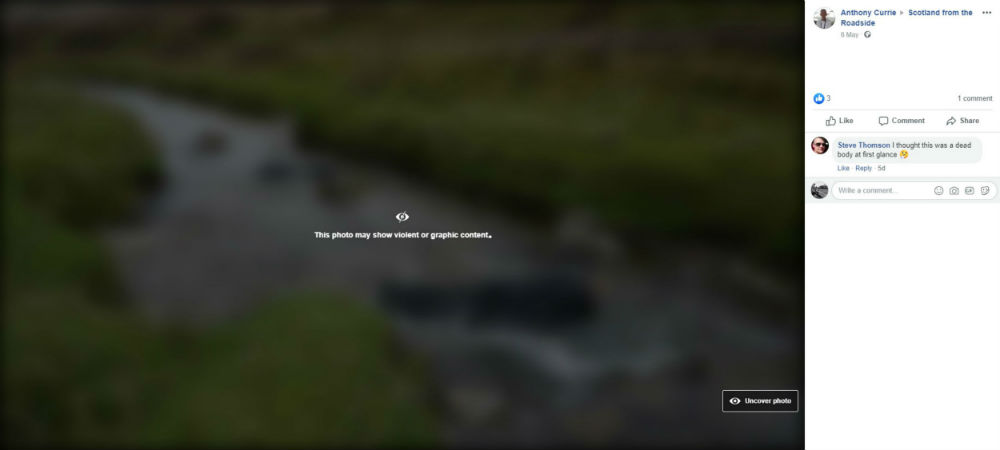PICTURES of gold hunters prospecting in a Scottish river have been censored by Facebook which thought they showed dead bodies.
The hilarious blunder happened after snaps were posted showing men dressed in black waterproof suits lying facedown in the water.
But Facebook, which has been widely accused of turning a blind eye to offensive material, placed a black screen on top of one of the picture, warning it might be graphic.
The pictures were taken on May 5 in a river at the gold finding hotspot of Leadhills, South Lanarkshire.

Anthony Currie, from Renfrew, took the pictures while out on a drive and stumbling across the scene and posted them to a Facebook page.
The page, thinking the images were a horror scene, took the snaps down and, on realising their mistake, asked Anthony to repost.
Facebook censorship then kicked in as what is believed to be a result of technology used to scan images for inappropriate content. Facebook, over the blacked-out screen, wrote: “May show violent or graphic content.”
The measure does not stop the picture being viewed as Facebook users can see it by clicking the “uncover photo” link.
Many viewers understood why Facebook had been deceived, including Steve Thomson who wrote: “I thought this was a dead body at first glance.”
Debs Mark added: “To be honest I thought it was a dead body.”
James Fry wrote: “There’s been a murder.”
Shirley Cordiner Quinn said: “Oh my god imagine walking along and seeing this.”
Dave Peacock added: “Looks like someone needs a lesson in hiding bodies.”
Shari Brandli said: “I was concerned until I noticed the snorkel!”
Clive Wilson added: “Looks like a scene from Crimewatch.”
Mari Stewart wrote: “Someone dead?”
Facebook has faced severe and sustained criticism for failing to remove inappropriate content, including pages dedicated to drugs, weapons and terrorism.
Facebook CEO Mark Zuckerberg announced in a post last November that censoring will be dealt with by an independent body.
He said in his ‘Blueprint for Content Governance and Enforcement’: “In the next year, we’re planning to create a new way for people to appeal content decisions to an independent body, whose decisions would be transparent and binding.
“The purpose of this body would be to uphold the principle of giving people a voice while also recognising the reality of keeping people safe.”
In 2017 Moffat was one of the prime locations for prospecting in the annual World Gold Panning Championships that saw thousands of competitors around the world descend on the area.
In 2015 a gold nugget weighing approximately 18 grams and worth around £10,000 was found in the neighbouring panning site of Wanlockhead.
A Facebook spokeswoman said: “It was mistakenly censored and the notice has since been removed.”
The gold prospectors in the pictures are excavating the riverbed in a technique known as sniping.
Sniping is the process where a person visually searches for gold underwater using a mask, snorkel and some excavating tools.
A competent gold sniper is able to work out where the best spots are for gold by assessing the lay of the land.
Wanlockhead Museum Trustee, Jon Evans, said searching for gold is a popular pastime in the area.
Jon said: “Significant amounts of gold has been found in the burns here for centuries, and thus has attracted a lot of serious panners.
“The gold in the area is not crown property meaning it is legal providing you have a license from the estate owner. We sell hundreds of licenses on behalf the estate owner each year.”
Jon also revealed the most important rule of gold prospecting.
Jon added: “The first rule of gold panning is don’t tell anyone you have gold.”
A license can be purchased from the Museum of Lead Mining in Wanlockhead, Dumfries and Galloway on behalf of the Buccleuch Estate.
An individual license for day costs £5, £15 for a week, and £30 for a year.
A family license starts at £10 for a day, £30 for a week, and £75 for a full year.
Britain’s biggest ever golden nugget was found in 2018 after it was valued at around £50,000 by gold expert Leon Kirk.
The 87.5 gram nugget was discovered in a Scottish riverbed and is said the be largest ever found in the UK.